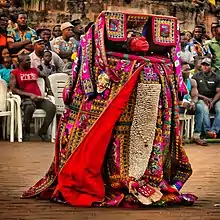Egungun
English
Yoruba

Alternative forms
- Egígún (Èkìtì)
- Eégún
Etymology
Folk etymology from the Odù Ifá (corpus of the Yoruba religion), specifically Ọ̀wọ́nrinṣẹ́ (Odu #105), states it comes from e- (“agent creating prefix”) + gún (“to arrive, to land”) + gún (“to align, to straighten, to put in order”), literally “the ones who arrive to put (the world) in order”. Said to be associated with the phrase sayégún (“One who aligns the world”).
Cognate with Ede Nago egoúngoún, Igala égwú, Igala Égwú. In Igala, the term in its noun form means corpse or dead body. This suggests that it comes from the same root as Igala ògwú (“killer instinct, spirit associated with killing”), in which the root gwú, likely means to kill or die. Thus, this term is proposed to be derived from Proto-Yoruboid *é-gwṹ, ultimately deriving from Proto-Yoruboid *gwú (“to die”). This is the same root that the term Ògún is believed to come from, thus making this a Doublet of Ògún. The root gwú in term is almost certainly from the same root as kú (“to die”), see *kú for its relation to other languages.
Pronunciation
- IPA(key): /ē.ɡṹ.ɡṹ/
Noun
Egúngún